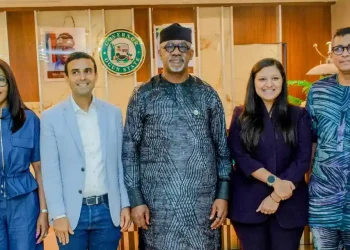University of Nigeria Team Develops Revolutionary Solution to Combat Climate Change While Creating Sustainable Products
In the early morning hours of a quiet Sunday, a team of young scientists from the University of Nigeria embarked on a journey that could reshape how the world tackles methane emissions. Their destination: a landfill site in Awka, Anambra State, where they would collect samples that might hold the key to solving multiple environmental challenges simultaneously.
The research project, spearheaded by Master’s student Luke Chidozie Okafor under the supervision of Professor Chioma Amadi, represents a groundbreaking approach to environmental science. The team is investigating how naturally occurring bacteria called methanotrophs can consume methane gas while producing valuable biodegradable materials.
The Scale of Nigeria’s Methane Challenge
Nigeria faces a significant methane problem. The country generates approximately 32 million tons of waste annually, with only 7% properly collected and disposed of in landfill sites. These facilities release massive quantities of methane, a greenhouse gas far more potent than carbon dioxide in terms of atmospheric warming.
The situation extends beyond waste management. Nigeria’s oil and gas industry contributes to roughly 4.5 million tons of methane emissions each year, representing 70% of the country’s total methane output. This makes Nigeria one of the world’s top ten methane emitters, with much of the gas simply burned off through flaring processes that convert it into carbon dioxide.
A Microscopic Solution with Macro Impact
The University of Nigeria team has identified methanotrophic bacteria as a potential game-changer. These remarkable microorganisms naturally consume methane as their primary food source, but their capabilities extend far beyond simple gas consumption. When digesting methane, these bacteria produce polyhydroxybutyrate (PHB), a biodegradable polymer that can serve as an eco-friendly alternative to traditional plastics.
“Methanotrophs are incredibly important microbes in terms of our climate but also in our future sustainable society,” according to recent research by Jia Wang, David R. Salem and Rajesh K. Sani. Their work highlights the potential for creating a “methane-based bio-industry.”
From Waste to Wealth: Multiple Applications
The research team’s vision extends beyond plastic alternatives. Professor Amadi explains that the bacterial biomass itself can serve as single-cell protein, potentially creating a sustainable source of animal feed. This multi-product approach could address several challenges simultaneously: reducing greenhouse gas emissions, creating biodegradable materials, and producing livestock nutrition.
The concept of transforming environmental problems into economic opportunities particularly resonates with team members. Pharmacy student Nadia Chizimuzor Iloka notes, “If you think of this project, basically, we are turning waste into wealth.”
Student-Led Innovation with Global Backing
The project emerged from Okafor’s recognition that Nigeria’s abundant methane sources, typically viewed as environmental liabilities, could become valuable resources. His approach builds on recent global research demonstrating that landfill methane can effectively feed methanotrophic bacteria for bioplastic production.
The diverse team includes three Master’s students and three pharmacy students, all motivated by the intersection of environmental protection and public health. Team member Sylvia Mmesomachi Mbaji joined because of her interest in “climate changes and the health part of it,” while Olive Chinezerem Egbuchelem is driven by the goal of “making sure that people live in a good and conducive environment.”
Addressing an Indigenous Problem
Okafor emphasizes the importance of homegrown solutions: “Our problem is indigenous to us. None can solve that problem except us.” This perspective reflects a broader trend of African scientists developing locally relevant innovations rather than waiting for external solutions.
The project has attracted support beyond the university, with funding from 3 E’s 4 Africa, a diaspora-led organization promoting sustainable innovations across the continent. This backing demonstrates growing recognition of the project’s potential impact.
Commercial Viability and Future Prospects
Historically, the main obstacle to methane-based bioplastic production has been finding economically viable methane sources. Nigeria’s abundance of methane from landfills, oil and gas operations, and livestock farming could solve this challenge, making commercial production feasible.
The team’s laboratory work at the University of Nigeria’s modern microbiology facility in Nsukka involves isolating the most effective bacterial strains and optimizing their methane conversion processes. Their field collections provide both the raw materials (methane gas) and the biological tools (bacteria) needed for the process.
Environmental and Economic Impact
The potential benefits of successful implementation are substantial. The technology could significantly reduce Nigeria’s methane emissions while creating new industries around biodegradable plastics and animal feed production. For communities living near gas flaring sites and landfills, this could mean improved air quality and reduced health risks.
Nigeria has already committed to reducing gas flaring through international partnerships, including the World Bank’s Zero Routine Flaring by 2030 initiative. However, practical solutions like the University of Nigeria project will be essential for meeting these commitments.
The Path Forward
Professor Amadi acknowledges that while African scientists have made significant research progress, translating laboratory discoveries into commercial applications will require additional support. The growing interest from startup investors and African philanthropists in environmental solutions suggests promising opportunities ahead.
Okafor envisions this work contributing to “a methane-based bioeconomy,” where waste streams become valuable inputs for sustainable manufacturing. With Nigeria’s entrepreneurial spirit and abundant methane resources, the country appears well-positioned to lead this emerging sector.
The project represents more than just scientific innovation; it embodies a new approach to environmental challenges where solutions create economic value rather than simply impose costs. As the team continues their research, they’re not just collecting samples from landfills – they’re potentially collecting the building blocks of a more sustainable future.
This story was reported from Enugu and Awka, Nigeria, highlighting the innovative work being conducted at the University of Nigeria’s microbiology laboratories.

Bird Story Agency is a specialist news agency driven by the resolve to project Africa by telling positive stories about the continent.





















